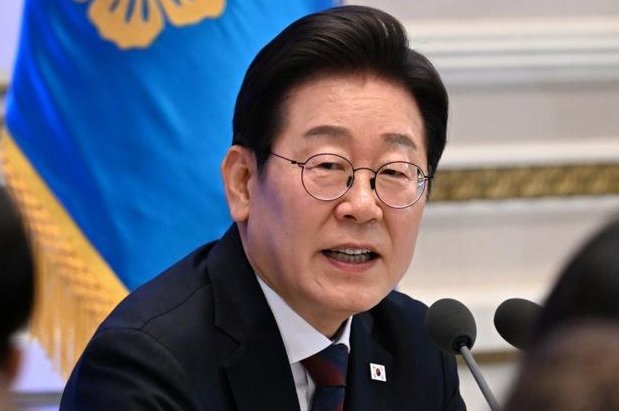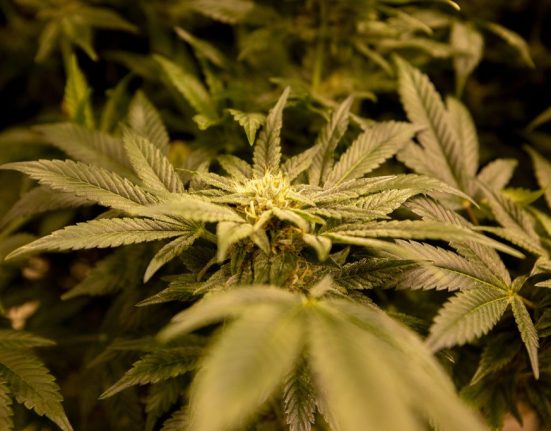South Korean President Lee Jae Myung delivers a speech during a press conference to mark his first 30 days in office at the Yeongbingwan, the state guest house of the Blue House, in Seoul in early July. File photo by Kim Min-Hee/EPA/Pool
Aug. 14 (UPI) — The South Korean government will hold a special event Friday to commemorate President Lee Jae Myung’s recent election, coinciding with the 80th anniversary of Liberation Day from Japan’s 1910-1945 colonial rule.
The ceremony will be held because Lee did not have a formal inauguration. He assumed office immediately after winning the June 3 election, which was triggered by the impeachment of former President Yoon Suk-yeol over his declaration of martial law last December.
In his first two months in office, Lee has introduced a range of economic and legal policies, which could influence the decisions of foreign investors. So far, reactions have been mixed.
One of the most contentious issues is the so-called Yellow Envelope Act, intended to safeguard subcontracted workers, curb corporate lawsuits seeking damages from strikes and expand legal responsibility for executives who avoid collective bargaining.
Business associations have asked the National Assembly to reconsider its legislation, which would amend the Trade Union Act, warning that it could negatively affect the economy by emboldening already militant trade unions.
However, the ruling Democratic Party has vowed to pass the bill this month, which alarmed foreign companies here, as demonstrated by the response from the American Chamber of Commerce in Korea.
“A flexible labor environment is essential to strengthening Korea’s competitiveness as a business hub in the Asia-Pacific region,” its chairman, James Kim, said in a statement. “If enacted in its current form, this legislation could influence future investment decisions by American companies considering Korea.”
The European Chamber of Commerce in Korea also voiced concern, particularly over the broadened definition of “employer” to include those from subcontracted firms. It even warned that it could prompt foreign firms to exit the market.
“Given the numerous criminal sanctions imposed on employers under the Trade Union Act, this vague and expanded definition may treat business operators as potential criminals and significantly discourage business activity,” the chamber said.
“The impact is particularly severe for foreign-invested companies, which are highly sensitive to legal risks stemming from labor regulations. For example, if a company faces the risk of criminal penalties for refusing to engage in collective bargaining — especially in situations where it is unclear which union to negotiate with — it may ultimately choose to withdraw from the Korean market,” it said.
On July 31, the new administration announced plans to roll back recently imposed tax cuts on corporate income and capital gains, which were made in 2022 during the Yoon administration in 2022.
Global financial think tanks, including Citigroup, Goldman Sachs and CLSA, expressed concern. Citigroup noted that the proposed tax hikes would be “unfavorable for business and equity market investors’ confidence.”
The market reaction was swift. On Aug. 1, the next trading day, offshore investors sold $470 million worth of benchmark KOSPI shares, ending a seven-day streak of net purchases. They have since returned as buyers, though.
“President Lee has pledged to double the nation’s stock market value during his five-year stint, and one of his main strategies was to draw foreign investment by improving the investment environment,” Lee Phil-sang, an adviser at Aju Research Institute of Corporate Management and former Seoul National University economics professor, told UPI.
“Yet, his administration has come up with various anti-corporate policies. They would not encourage foreigners to invest in Korea,” he said.
Still, not all of Lee’s initiatives have disappointed markets.
Early last month, the country’s unicameral parliament approved an amendment to the Commercial Act, expanding board members’ fiduciary obligations to better protect minority shareholders’ interests.
President Lee has endorsed the legislation to help eliminate the so-called “Korea discount,” which refers to the tendency for Korean companies to trade at lower valuations than comparable firms in other major economies.
“After President Lee made an oath, stock prices have remained bullish and foreign investors have gobbled up Korean shares. That is clear evidence that his foreign investor policy is working,” Seoul-based consultancy Leaders Index CEO Park Ju-gun said in a phone interview.
Since Lee’s inauguration, the KOSPI has jumped nearly 20%. During the span, foreign investors have been buyers, pouring in more than $6.7 billion, according to the Korea Exchange.
By contrast, Sogang University professor Kim Young-ick downplayed the appreciation of stock values.
“Our share prices have risen mainly due to the removal of political uncertainty following the ouster of erstwhile President Yoon. That is simply the normalization of temporarily undervalued stock prices,” he said.
“To continue the upward momentum, the country’s economy should perform better. President Lee’s goal of increasing the potential economic growth rate to 3% through AI investment sounds good. But it will be very difficult to achieve,” he added.







